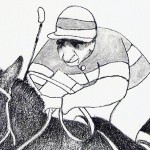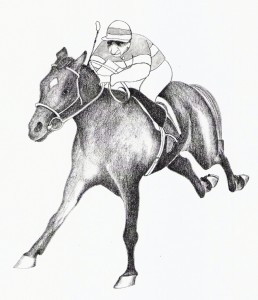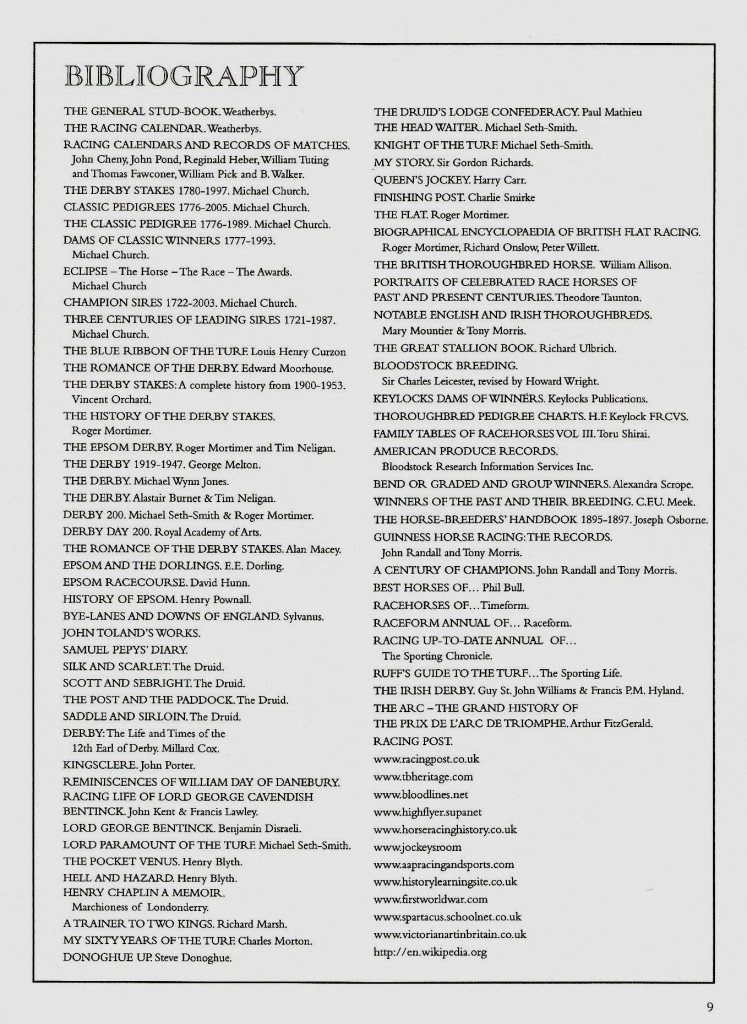
Brighton Races
This is a story of racing at the end of the 1940s, a young Michael, his dad and a dodgy bookies runner known to the family.
I had recently seen ‘Brighton Rock’, the film of Graham Greene’s classic crime thriller, where a young Richard Attenborough plays ‘Pinkie’, the leader of a razor gang, working a bookmaker protection racket at Brighton races. And although this era was at an end, the film had given the racecourse a popular folklore notoriety that added a buzz to the meetings.
On learning that a race meeting at Brighton coincided with our family holiday, I persuaded my father to take me, and, it proved a day to remember for this impressionable 13-year-old. To begin with, I spotted Billy Cook, the Australian champion jockey, walking towards us at the back of the stands. Hastily producing a racecard and pen, I asked him for his autograph. Cook, who had been in England for about three months, already had the tinge of a London accent, and his gaunt face and heavy eyebrows belied his pleasant manner. Plucking up courage I said, “Are you riding anything good today Billy?”
“Well I’ve only got two rides; the one in the first is a long shot, but my ride in the last has a chance.”
“Last race Cook, eh?” I replied, for this was what Fleet Street had dubbed him after a recent run of last race successes.
Getting into racecourses was quite expensive in those days, and as I recall, Dad paid an uncomfortable amount to get into Tattersalls, followed by a small contribution to the Gateman to look the other way as I scrambled over the turnstile.
Once inside, we found our bearings and marked our selections in the racecard. It was a bright sunny day, the smell of freshly cut grass, mingling with the shimmering heat-haze and the sound of horses hooves, created a sudden assault on my boyhood senses which crystallised itself into a lasting memory.
Neither Dad nor I had a bet in the first race, and Billy Cook’s long shot finished well down the field. But running in the next was National Spirit, a long time favourite of mine, who, trained by Vic Smyth at Epsom, had twice won the Champion Hurdle. I made him my ‘Nap of the Day,’ and, having obtained evens to a pound note, our cheers were drowned in the deafening roar, as the old fella drew away coming up the hill.
Just after Dad had collected our winnings, an incident occurred that changed our day. Frank Rogers, a bookies runner and one of Uncle Albert’s shadier friends, appeared hurrying towards us.
“Are you staying for the last, Stan?” he anxiously enquired.
“Yes it’s a lovely day isn’t it,” said Dad.
“Would you do me a great favour and look after my briefcase?”
Dad hesitated. “It will get me out of a spot,” Frank added.
“OK, but where will we meet you?” Dad cautiously enquired.
“Up there at the back of the stand,” Frank said pointing, “after the weigh-in.”
As the runners were leaving the Paddock for the next – the Brighton Mile – I persuaded Dad to go halves on Star Signal in the first leg of a Tote Double, while I looked after Frank’s case. Once again we had something to shout about, as Star Signal won in a canter, while Dad resumed control of the briefcase.
Finding a place to sit while enjoying our tea and buns, we began to question why Frank had trusted us with his briefcase and why he looked so anxious about it.
After the second sticky bun, I could no longer contain my curiosity.
“Come on Dad, let’s have a quick look inside.”
“Its probably locked,” he replied.
“It isn’t Dad, I’ve just tried it.”
“Well, OK then,” Dad said with uncharacteristic abandon, “just a quick look.”
I flicked the case open … “Bloody hell!”… and shut it smartly.
It was full of bundles and bundles of pound notes. Just then, the loudspeakers announced the overweights for the next race and Dad scuttled off, unsteadily, to bet a few shillings on the Tote, leaving me to clasp the briefcase tightly with sweaty hands.
In stark contrast to the contents of the case, Dad’s place on the Tote paid 4/3d (21p). And even then it took us a minute or two to sort out the right ticket, since in those days, they had to be held up to the light to read a series of perforations that revealed not only the number of the horse and race, but also a four letter code-word. This persistent scrutiny tested the patience of both the punters and cashiers alike, and continually caused lengthy, slow moving queues at the pay-out windows.
Exchanging our Daily Double ticket for the second leg, we both agreed on the Duchess of Norfolk’s Suivi, the long odds on favourite, and, after checking the safety of the briefcase for the tenth-time, Dad was able to relax in time to see the horse skate home by four lengths.
It was now time for the last race and, remembering to back Billy Cook, we opted to bet with the bookies, as the Tote queues continued to grow. The bet on, Dad and I stood high in the stand to watch the race and wait for Frank. Cook was riding Dorothy Paget’s Wynola, and we watched her famous blue, with yellow hoop colours glide gracefully to the start. The best price available was 13-8, but, having bumped into Billy at the start of the day, we felt duty bound to back it.
A furlong out, the roar of the crowd told the story, as Cook cruised into the lead to win easily, and whilst by our standards we had had a stunningly successful day’s racing, the presence of Frank’s briefcase put our profit into perspective. Ten minutes later, when we were just beginning to worry about him, he suddenly appeared at our side.
“Thanks for looking after the case Stan. Saved my day. Have to dash now I’m afraid.”
And with that, he took the case, looking back to say “Must buy you a drink next time.”
For a moment we stood there stunned, until Dad said, “Thank heavens for that, I thought we were going to get stuck with all that money!”
Suddenly, we remembered we hadn’t collected our winnings, so in a bit of a panic, Dad gave me the bookie’s ticket to collect, while he went off to cash our Daily Double.
I caught up with Dad at the back of the Tote queue.
“One pound sixteen shillings between us,” he said.
“Oh well, it could be worse,” I replied, “but I’d have rather hung on to the briefcase!” And part of me meant it.
It should come as no surprise to the reader, that flashbacks of Frank’s briefcase haunted me throughout my teenage years.
This short story is from Ripping Gambling Yarns,
of which Michael has a few signed copies for sale.
Illustrations by Julia Jacs


